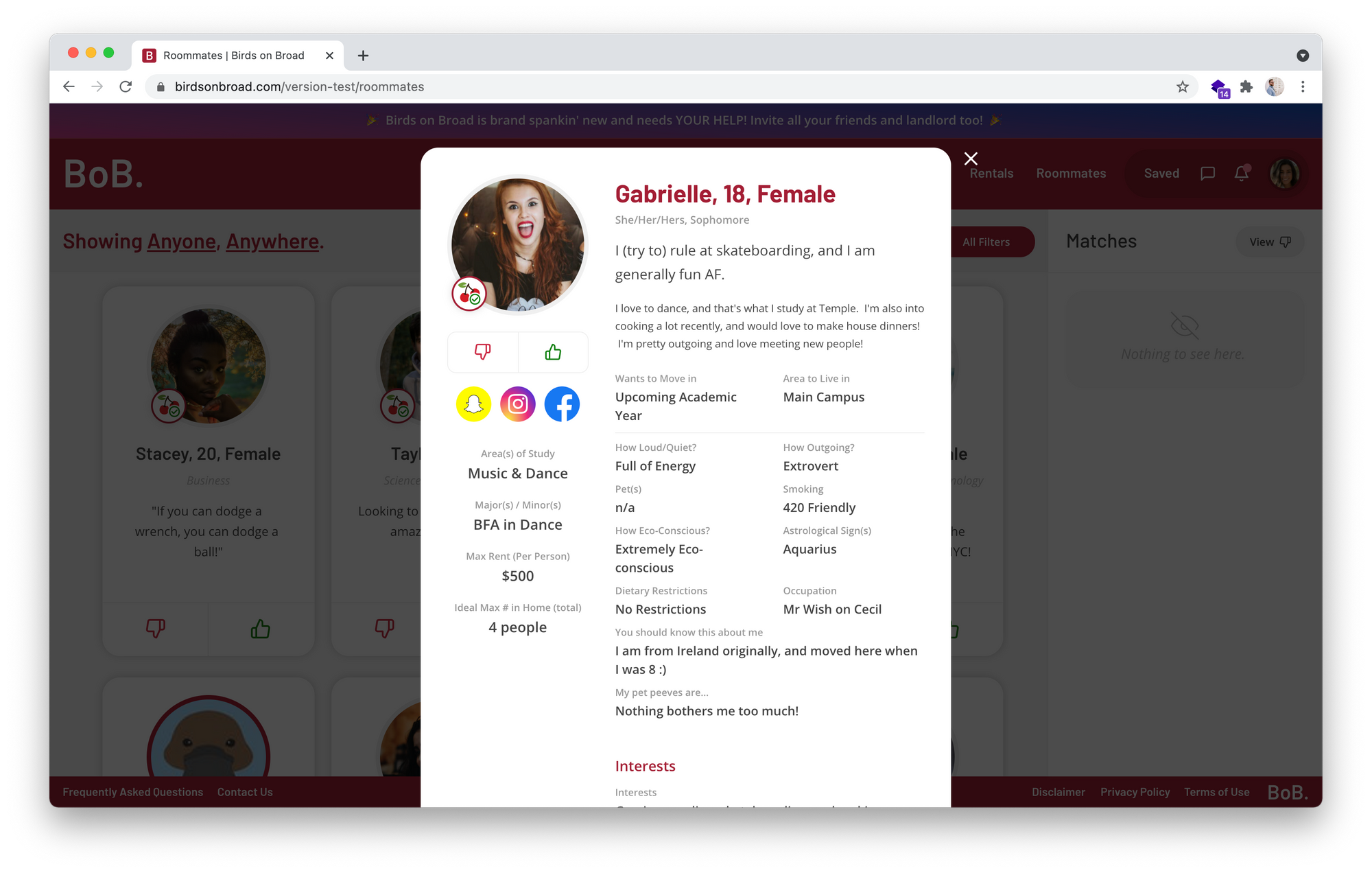Bubble App of the Day: Birds on Broad

We asked Birds on Broad founder, Richard Sherman, about building a housing and roommate matching platform in Philadelphia, PA. Richard has a traditional web development and marketing background. He chose Bubble because the no-code platform offered a quick way to build a fully-functional web app and rapidly iterate in early development without having to code.
Tell us about your app and what it does.
Birds on Broad is a housing and roommate matching platform for the Temple University area in Philadelphia, PA. We wanted to provide a graceful solution for both prospective individual/group renters and landlords to help simplify and streamline the process. We brought all of the necessary elements of the housing search and the roommate search into a single unified experience, and removed common barriers that new-to-renting tenants find themselves facing.


How does your app work?
For Renters, users begin by creating an account. Once they've signed up, they are directed to either start looking for housing or start finding roommates. If the user has friends that, together, want to find a new house, they can create a new Group as well. Users can perform any action on the site as either their personal profile or as part of that group profile.
While looking for housing, users can search for and filter rentals that match special student-specific criteria, and narrow down results by cost per person, per bedroom, or total. If users find a rental that's bigger than they otherwise would be able to fill, they are given the opportunity to fill those extra spots with new roommates. while browsing property details, they see all the normal unit information as well as extra affordability data that helps young/inexperienced renters understand the total expected costs. Lastly, individuals and groups can start conversations and request tours with the lister for the unit right on the site.
If seeking roommates first, users and groups can find roommates sharing similar lifestyles and housing preferences. Using double-blind matching, both user and group profiles are prompted to like or dislike potential matches, and if two profiles find each other they can start up a conversation. From there they can either form new groups or all merge into an existing group.
If a user is listing one or more properties, they are guided to sign up and create their company, add co-workers and start contributing properties to the search. They are able to provide the common property information as well as unique details specific to student housing, like walking distance to Temple University, per-person/per-bedroom cost breakdown and common student-specific leasing options.
The most important benefit for agents and homeowners listing properties to students and groups of renters is the ability to correspond with the entire group at once, in one central location. Additionally, listers are able to provide suggestions for other properties they manage, and this will eventually lead to listers facilitating rentals to large groups of renters filling multiple properties close together all at once.
Tell us a little about your background and how you discovered no-code tools like Bubble.
Coming from a traditional web dev and marketing background, I'd been aware of some of the no-code options for years. Bubble in particular seemed to be such a fantastic tool for early-stage prototyping and rapid iterating proof-of-concept I started using it for personal small projects. More and more in the marketing world it seemed like what I built needed less and less custom functionality and more and more flexibility and freedom. Bubble in particular delivered the best middle ground between fast, flexible, and agile visual layout and power/scalability to run a small production-scale app. 10/10 would recommend.
Why did you build your app on Bubble?
Being able to rapidly iterate in early development and now being able to adapt both the whole app and individual features over time has proved invaluable, and that flexibility and power is currently helping us add a native mobile suite to the Birds on Broad app that would have been far too cost- and labor-intensive without the UI management, version control, collaboration, and baked-in mobile support. All in all, it's been the swiss army knife we needed to get a concept from ideation to launch faster and more completely than we could have hoped.
What have been your milestones or successes so far?
We recently launched the site to the Temple crowd, so we still have a ways to go, but we've received high marks from all user types that it's scratching an itch they haven't been able to achieve with other platforms. We've got a modest user base now, but are hoping to increase to 1,500 users by end of 2021, and 5,000+ users by end of year 2022. We're also hoping to increase the number of properties available to over 500 by the end of 2021.
What are your next steps or future plans for your app?
We have a feature backlog 300+ tasks long for everything from providing a seamless native mobile experience, smarter algorithms for user matching, local business partner support and providing a fuller suite of agency/high-volume lister support and reporting. That and hiring a marketing team to help spread the word!
About Bubble
Bubble is a leader in the no-code movement. Bubble offers a powerful point-and-click web editor and cloud hosting platform that allows users to build fully customizable web applications and workflows, ranging from simple prototypes to complex marketplaces, SaaS products, and more. Over 500,000 users are currently building and launching businesses on Bubble - many have gone on to participate in top accelerator programs, such as Y Combinator, and even raise $365M in venture funding. Bubble is more than just a product. We are a strong community of builders and entrepreneurs that are united by the belief that everyone should be able to create technology.